初中英语物主代词讲解练习教学教材
- 格式:doc
- 大小:33.50 KB
- 文档页数:7

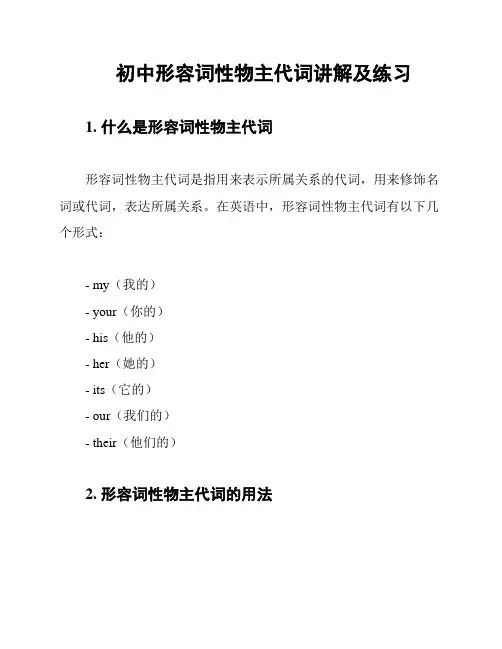
初中形容词性物主代词讲解及练习1. 什么是形容词性物主代词形容词性物主代词是指用来表示所属关系的代词,用来修饰名词或代词,表达所属关系。
在英语中,形容词性物主代词有以下几个形式:- my(我的)- your(你的)- his(他的)- her(她的)- its(它的)- our(我们的)- their(他们的)2. 形容词性物主代词的用法形容词性物主代词在句子中通常用来表示所属关系,修饰名词或代词。
一般来说,形容词性物主代词位于名词之前,用来指出该名词所属的人或物。
例如:- This is my book.(这是我的书。
)my book.(这是我的书。
)- His car is blue.(他的车是蓝色的。
)His car is blue.(他的车是蓝色的。
)- Is this your cat?(这是你的猫吗?)your cat?(这是你的猫吗?)3. 形容词性物主代词的练请根据句子的意思,选择正确的形容词性物主代词填空,并将答案填写在横线上。
2. Is this _________ (你的) pen?3. _________ (他的) house is big and beautiful.4. Do you want to see _________ (她的) new dress?5. The cat is licking _________ (它的) paws.6. _________ (我们的) school has a swimming pool.7. Those are _________ (他们的) bicycles.答案:1. My2. Your3. His4. Her5. Its6. Our7. Their注意:以上答案仅供参考,根据具体题目的意思进行答题。
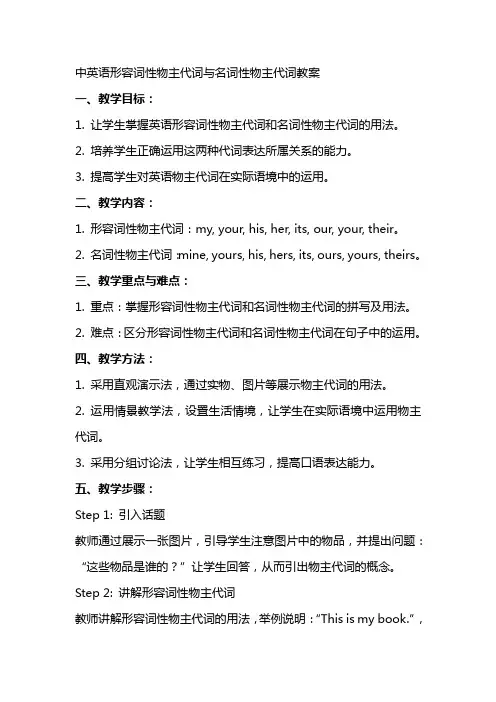
中英语形容词性物主代词与名词性物主代词教案一、教学目标:1. 让学生掌握英语形容词性物主代词和名词性物主代词的用法。
2. 培养学生正确运用这两种代词表达所属关系的能力。
3. 提高学生对英语物主代词在实际语境中的运用。
二、教学内容:1. 形容词性物主代词:my, your, his, her, its, our, your, their。
2. 名词性物主代词:mine, yours, his, hers, its, ours, yours, theirs。
三、教学重点与难点:1. 重点:掌握形容词性物主代词和名词性物主代词的拼写及用法。
2. 难点:区分形容词性物主代词和名词性物主代词在句子中的运用。
四、教学方法:1. 采用直观演示法,通过实物、图片等展示物主代词的用法。
2. 运用情景教学法,设置生活情境,让学生在实际语境中运用物主代词。
3. 采用分组讨论法,让学生相互练习,提高口语表达能力。
五、教学步骤:Step 1: 引入话题教师通过展示一张图片,引导学生注意图片中的物品,并提出问题:“这些物品是谁的?”让学生回答,从而引出物主代词的概念。
Step 2: 讲解形容词性物主代词教师讲解形容词性物主代词的用法,举例说明:“This is my book.”,并让学生跟读,强化记忆。
Step 3: 讲解名词性物主代词教师讲解名词性物主代词的用法,举例说明:“This book is mine.”,并让学生跟读,强化记忆。
Step 4: 区分形容词性物主代词和名词性物主代词教师通过例句对比,让学生区分形容词性物主代词和名词性物主代词的使用场合,如:“Is this your car? Yes, it's mine.”Step 5: 练习教师设置情景,让学生运用形容词性物主代词和名词性物主代词进行对话练习,如:“A: Is this pen yours? B: Yes, it's mine. A: Can I use it? B: Sure, you can use it.”Step 6: 总结与作业教师对本节课的内容进行总结,强调形容词性物主代词和名词性物主代词的用法,并布置作业:用形容词性物主代词和名词性物主代词写一篇小短文,描述自己的房间。
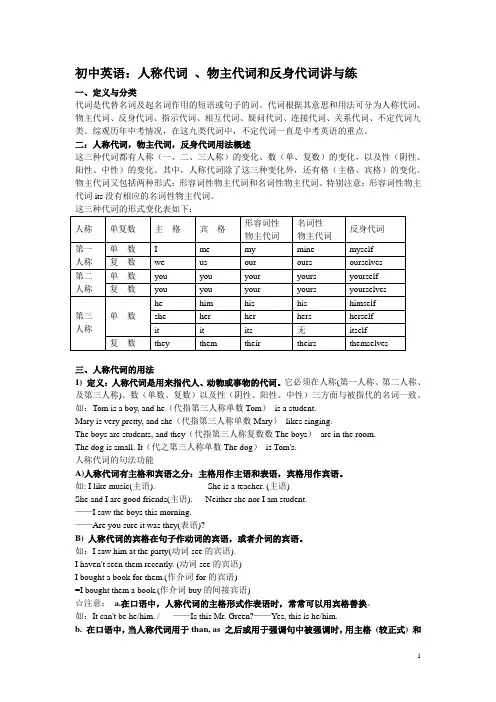
初中英语:人称代词、物主代词和反身代词讲与练一、定义与分类代词是代替名词及起名词作用的短语或句子的词。
代词根据其意思和用法可分为人称代词、物主代词、反身代词、指示代词、相互代词、疑问代词、连接代词、关系代词、不定代词九类。
综观历年中考情况,在这九类代词中,不定代词一直是中考英语的重点。
二:人称代词,物主代词,反身代词用法概述这三种代词都有人称(一、二、三人称)的变化、数(单、复数)的变化,以及性(阴性、阳性、中性)的变化。
其中,人称代词除了这三种变化外,还有格(主格、宾格)的变化。
物主代词又包括两种形式:形容词性物主代词和名词性物主代词。
特别注意:形容词性物主代词its没有相应的名词性物主代词。
这三种代词的形式变化表如下:人称单复数主格宾格形容词性物主代词名词性物主代词反身代词第一人称单数I me my mine myself 复数we us our ours ourselves第二人称单数you you your yours yourself 复数you you your yours yourselves第三人称单数he him his his himselfshe her her hers herselfit it its 无itself复数they them their theirs themselves三、人称代词的用法1) 定义:人称代词是用来指代人、动物或事物的代词。
它必须在人称(第一人称、第二人称、及第三人称)、数(单数、复数)以及性(阴性、阳性、中性)三方面与被指代的名词一致。
如:Tom is a boy, and he(代指第三人称单数Tom)is a student.Mary is very pretty, and she(代指第三人称单数Mary)likes singing.The boys are students, and they(代指第三人称复数数The boys)are in the room.The dog is small. It(代之第三人称单数The dog)is Tom's.人称代词的句法功能A)人称代词有主格和宾语之分:主格用作主语和表语,宾格用作宾语。
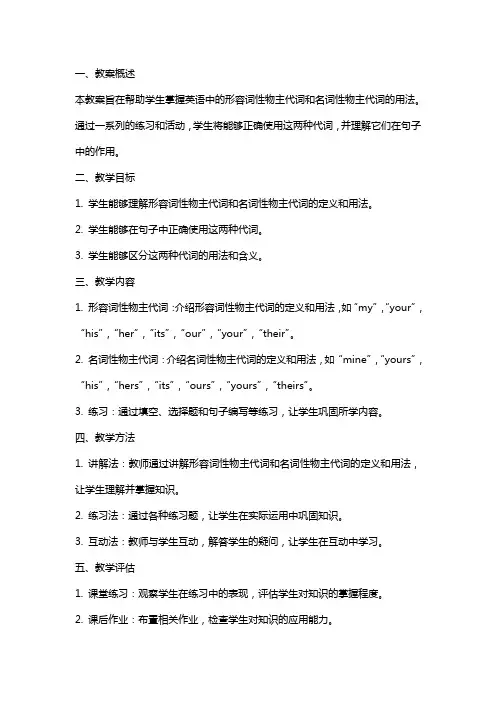
一、教案概述本教案旨在帮助学生掌握英语中的形容词性物主代词和名词性物主代词的用法。
通过一系列的练习和活动,学生将能够正确使用这两种代词,并理解它们在句子中的作用。
二、教学目标1. 学生能够理解形容词性物主代词和名词性物主代词的定义和用法。
2. 学生能够在句子中正确使用这两种代词。
3. 学生能够区分这两种代词的用法和含义。
三、教学内容1. 形容词性物主代词:介绍形容词性物主代词的定义和用法,如“my”,“your”,“his”,“her”,“its”,“our”,“your”,“their”。
2. 名词性物主代词:介绍名词性物主代词的定义和用法,如“mine”,“yours”,“his”,“hers”,“its”,“ours”,“yours”,“theirs”。
3. 练习:通过填空、选择题和句子编写等练习,让学生巩固所学内容。
四、教学方法1. 讲解法:教师通过讲解形容词性物主代词和名词性物主代词的定义和用法,让学生理解并掌握知识。
2. 练习法:通过各种练习题,让学生在实际运用中巩固知识。
3. 互动法:教师与学生互动,解答学生的疑问,让学生在互动中学习。
五、教学评估1. 课堂练习:观察学生在练习中的表现,评估学生对知识的掌握程度。
2. 课后作业:布置相关作业,检查学生对知识的应用能力。
3. 考试:安排期末考试,全面评估学生对形容词性物主代词和名词性物主代词的掌握情况。
六、教学步骤1. 导入:通过展示物品并询问学生它们的归属,引导学生思考物主代词的用法。
2. 讲解形容词性物主代词:教师举例说明形容词性物主代词的用法,如“This is my book.”,并引导学生理解其在句子中的作用。
3. 讲解名词性物主代词:教师举例说明名词性物主代词的用法,如“This book is mine.”,并引导学生理解其在句子中的作用。
4. 对比练习:让学生区分形容词性物主代词和名词性物主代词的用法,如“This is his book.”和“This book is his.”,并解释其区别。

初中英语代词教案及练习一、教学目标:1. 让学生掌握代词的分类及用法。
2. 培养学生正确运用代词进行表达的能力。
3. 提高学生英语写作和口语表达能力。
二、教学内容:1. 代词的分类:人称代词、物主代词、反身代词、指示代词、不定代词。
2. 代词的用法:主格、宾格、所有格。
3. 特殊代词:each, every, neither, either。
三、教学重点与难点:1. 重点:代词的分类及用法。
2. 难点:特殊代词的用法及区别。
四、教学方法:1. 任务型教学法:通过完成各种任务,让学生实践代词的用法。
2. 互动式教学法:引导学生参与课堂讨论,提高口语表达能力。
3. 情景教学法:创设真实情境,让学生在实际语境中运用代词。
五、教学步骤:1. 导入:通过提问引导学生思考代词的作用,激发学习兴趣。
2. 讲解:介绍代词的分类及用法,讲解特殊代词的用法及区别。
3. 练习:进行代词填空练习,巩固所学知识。
4. 任务:分组完成代词运用任务,提高实际应用能力。
5. 总结:对本节课内容进行总结,强调重点知识点。
6. 作业:布置代词相关练习,巩固所学知识。
注意事项:1. 在教学过程中,注意引导学生区分代词的用法,避免混淆。
2. 针对不同学生的学习情况,进行针对性辅导,提高教学质量。
3. 鼓励学生积极参与课堂讨论,提高口语表达能力。
4. 及时批改作业,反馈学生学习情况,调整教学方法。
六、教学评价:1. 通过课堂表现、作业完成情况和练习正确率来评价学生的学习效果。
2. 注重学生代词运用能力的提高,以及他们在实际语境中运用英语的信心和勇气。
七、教学拓展:1. 邀请英语母语者进行交流,让学生在真实语境中练习代词的用法。
2. 组织英语角活动,让学生在小组活动中运用代词进行对话。
3. 推荐英语学习网站或APP,让学生课后自主学习代词相关知识。
八、教学资源:1. 教材:人教版《新目标英语》或其他合适的初中英语教材。
2. 课件:制作精美的课件,辅助教学。
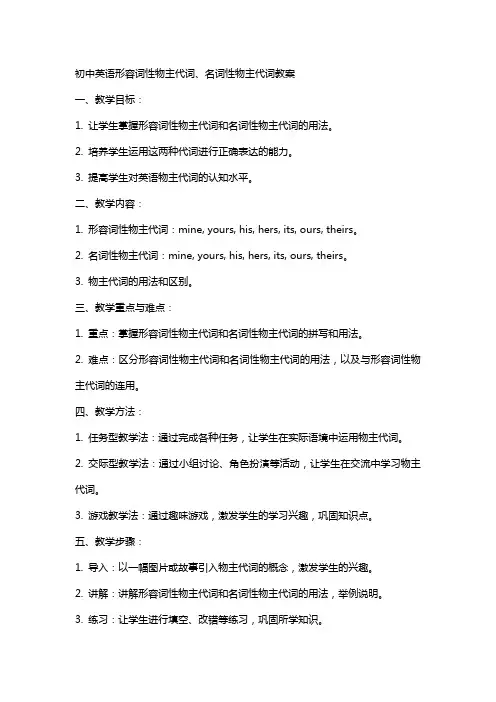
初中英语形容词性物主代词、名词性物主代词教案一、教学目标:1. 让学生掌握形容词性物主代词和名词性物主代词的用法。
2. 培养学生运用这两种代词进行正确表达的能力。
3. 提高学生对英语物主代词的认知水平。
二、教学内容:1. 形容词性物主代词:mine, yours, his, hers, its, ours, theirs。
2. 名词性物主代词:mine, yours, his, hers, its, ours, theirs。
3. 物主代词的用法和区别。
三、教学重点与难点:1. 重点:掌握形容词性物主代词和名词性物主代词的拼写和用法。
2. 难点:区分形容词性物主代词和名词性物主代词的用法,以及与形容词性物主代词的连用。
四、教学方法:1. 任务型教学法:通过完成各种任务,让学生在实际语境中运用物主代词。
2. 交际型教学法:通过小组讨论、角色扮演等活动,让学生在交流中学习物主代词。
3. 游戏教学法:通过趣味游戏,激发学生的学习兴趣,巩固知识点。
五、教学步骤:1. 导入:以一幅图片或故事引入物主代词的概念,激发学生的兴趣。
2. 讲解:讲解形容词性物主代词和名词性物主代词的用法,举例说明。
3. 练习:让学生进行填空、改错等练习,巩固所学知识。
4. 互动:分组进行角色扮演,让学生在实际语境中运用物主代词。
5. 总结:对本节课的内容进行总结,强调重点和难点。
6. 作业:布置相关的练习题,让学生课后巩固所学知识。
六、教学拓展:1. 对比英语物主代词与中文所有格的区别,如“我的”(英语:mine)与“我的”(中文:我的)。
2. 探讨物主代词在特定情境下的用法,如在与朋友、家人、同学之间的交流。
七、课堂活动:1. 制作物主代词的手工制品,如卡片、海报等,增强学生对知识的记忆。
2. 举办物主代词知识竞赛,激发学生的学习兴趣。
八、课后作业:1. 完成课后练习题,巩固所学知识。
2. 结合生活实际,用物主代词写一段话,描述自己的物品或他人的物品。

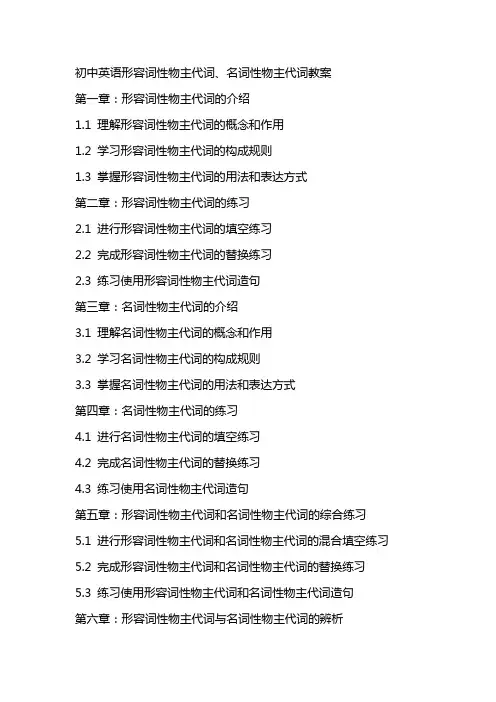
初中英语形容词性物主代词、名词性物主代词教案第一章:形容词性物主代词的介绍1.1 理解形容词性物主代词的概念和作用1.2 学习形容词性物主代词的构成规则1.3 掌握形容词性物主代词的用法和表达方式第二章:形容词性物主代词的练习2.1 进行形容词性物主代词的填空练习2.2 完成形容词性物主代词的替换练习2.3 练习使用形容词性物主代词造句第三章:名词性物主代词的介绍3.1 理解名词性物主代词的概念和作用3.2 学习名词性物主代词的构成规则3.3 掌握名词性物主代词的用法和表达方式第四章:名词性物主代词的练习4.1 进行名词性物主代词的填空练习4.2 完成名词性物主代词的替换练习4.3 练习使用名词性物主代词造句第五章:形容词性物主代词和名词性物主代词的综合练习5.1 进行形容词性物主代词和名词性物主代词的混合填空练习5.2 完成形容词性物主代词和名词性物主代词的替换练习5.3 练习使用形容词性物主代词和名词性物主代词造句第六章:形容词性物主代词与名词性物主代词的辨析6.1 学习形容词性物主代词和名词性物主代词的差异6.2 练习区分和使用形容词性物主代词和名词性物主代词6.3 讨论形容词性物主代词和名词性物主代词在实际语境中的应用第七章:物主代词的句型结构7.1 学习使用物主代词的常见句型结构7.2 练习构成含有物主代词的句子7.3 分析并改正句型结构使用错误的例句第八章:物主代词在日常生活对话中的应用8.1 学习物主代词在日常对话中的用法8.2 模拟日常生活对话,练习使用物主代词8.3 分析日常对话中物主代词使用的正确与错误第九章:物主代词在写作中的运用9.1 学习物主代词在写作中的重要性和作用9.2 练习在写作中正确使用物主代词9.3 分析写作中物主代词使用不当的例文并修改第十章:物主代词的复习与测试10.1 复习形容词性物主代词和名词性物主代词的主要用法10.2 完成物主代词的综合练习题10.3 进行物主代词的知识点测试,评估学习效果第十一章:物主代词在特定情境中的运用11.1 学习物主代词在特定情境中的表达方式11.2 练习在不同的情境中正确使用物主代词11.3 讨论物主代词在不同情境中的语义差异第十二章:物主代词的扩展学习12.1 学习与物主代词相关的扩展词汇和短语12.2 练习使用扩展词汇和短语,增强语言表达12.3 分析并改正扩展词汇和短语使用错误的例句第十三章:物主代词的跨文化交际应用13.1 了解物主代词在不同文化背景中的用法差异13.2 学习如何在跨文化交际中正确使用物主代词13.3 模拟跨文化交际场景,练习使用物主代词第十四章:物主代词的教学活动设计14.1 设计旨在巩固物主代词知识的教学活动14.2 实施教学活动,收集学生反馈14.3 评估教学活动的效果,进行必要的调整第十五章:物主代词的学习评估与总结15.1 通过测试和练习评估学生对物主代词的掌握程度15.2 分析学生的学习成果,总结教学经验15.3 提出改进教学策略的建议,为今后的教学提供参考重点和难点解析本文主要介绍了形容词性物主代词和名词性物主代词的用法、辨析、句型结构、日常生活应用、写作运用以及跨文化交际等方面的知识。
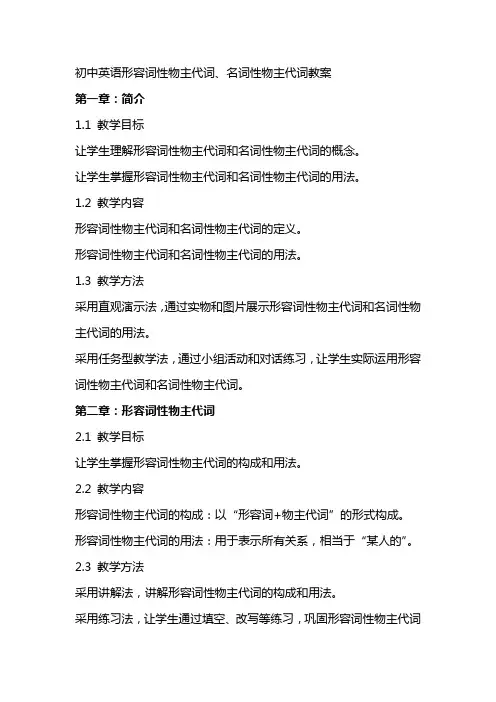
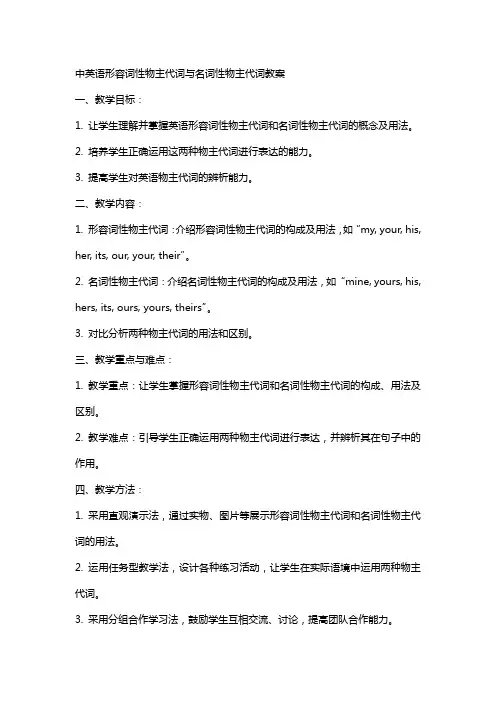
中英语形容词性物主代词与名词性物主代词教案一、教学目标:1. 让学生理解并掌握英语形容词性物主代词和名词性物主代词的概念及用法。
2. 培养学生正确运用这两种物主代词进行表达的能力。
3. 提高学生对英语物主代词的辨析能力。
二、教学内容:1. 形容词性物主代词:介绍形容词性物主代词的构成及用法,如“my, your, his, her, its, our, your, their”。
2. 名词性物主代词:介绍名词性物主代词的构成及用法,如“mine, yours, his, hers, its, ours, yours, theirs”。
3. 对比分析两种物主代词的用法和区别。
三、教学重点与难点:1. 教学重点:让学生掌握形容词性物主代词和名词性物主代词的构成、用法及区别。
2. 教学难点:引导学生正确运用两种物主代词进行表达,并辨析其在句子中的作用。
四、教学方法:1. 采用直观演示法,通过实物、图片等展示形容词性物主代词和名词性物主代词的用法。
2. 运用任务型教学法,设计各种练习活动,让学生在实际语境中运用两种物主代词。
3. 采用分组合作学习法,鼓励学生互相交流、讨论,提高团队合作能力。
五、教学步骤:1. 导入新课:通过展示一幅图片,引导学生思考如何用英语表达图中物品的归属。
2. 讲解形容词性物主代词:介绍形容词性物主代词的构成及用法,如“my, your, his, her, its, our, your, their”。
3. 讲解名词性物主代词:介绍名词性物主代词的构成及用法,如“mine, yours, his, hers, its, ours, yours, theirs”。
4. 对比分析两种物主代词的用法和区别。
5. 实践练习:设计各种练习活动,让学生在实际语境中运用两种物主代词。
6. 总结与反馈:对本节课的内容进行总结,并对学生的学习情况进行反馈。
教学评价:通过课堂参与、练习完成情况、小组合作表现等方面评价学生的学习效果。
物主代词初中教案1. 知识目标(1)让学生掌握英语物主代词的分类及用法。
(2)使学生能够正确运用物主代词表达所属关系。
2. 能力目标(1)培养学生运用物主代词进行日常交流的能力。
(2)提高学生英语写作水平。
3. 情感目标(1)激发学生学习英语的兴趣。
(2)培养学生的团队协作精神。
二、教学重难点1. 教学重点:物主代词的分类、用法及所属关系的表达。
2. 教学难点:物主代词在实际语境中的运用。
三、教学步骤1. 导入新课(1)教师通过展示一张图片,引导学生观察并描述图片中的物品所属关系。
(2)学生用中文表达所属关系,教师适时引入英文物主代词的概念。
2. 知识讲解(1)教师讲解物主代词的分类:形容词性物主代词和名词性物主代词。
(2)举例说明形容词性物主代词和名词性物主代词的用法。
(3)引导学生理解物主代词所属关系的表达。
3. 课堂练习(1)教师给出若干句子,要求学生填入适当的物主代词,巩固所学知识。
(2)学生分组进行练习,互相检查并纠正错误。
4. 游戏环节(1)教师组织学生进行“物主代词接龙”游戏,增加课堂趣味性。
(2)学生通过游戏加深对物主代词的理解和运用。
5. 情境对话(1)教师设置一个情境,要求学生用物主代词完成对话。
(2)学生分组进行角色扮演,练习实际语境中的物主代词运用。
6. 课堂小结教师总结本节课所学内容,强调物主代词的重要性和用法。
四、课后作业1. 完成课后练习题,巩固物主代词的知识。
2. 结合日常生活,用物主代词写一段话,描述自己所属的物品。
五、教学反思本节课通过图片、讲解、练习、游戏等多种教学手段,使学生掌握了物主代词的分类、用法及所属关系的表达。
在课堂实践中,学生能够运用物主代词进行日常交流,提高了英语写作水平。
但在教学过程中,要注意引导学生区分形容词性物主代词和名词性物主代词的用法,以免产生混淆。
此外,可以适当增加课后实践环节,让学生更多地在实际语境中运用物主代词,提高语言运用能力。
初中物主代词讲解教案教学目标:1. 让学生理解物主代词的概念和用法。
2. 培养学生正确使用物主代词的能力。
3. 提高学生对英语语法的认识和运用能力。
教学重点:1. 物主代词的概念和分类。
2. 物主代词的用法和注意事项。
教学难点:1. 物主代词的区分和正确使用。
教学准备:1. PPT课件。
2. 练习题。
教学过程:Step 1:导入(5分钟)教师通过提问方式引导学生思考:同学们,你们知道我们平时在英语学习中经常用到的一种代词吗?对的,那就是物主代词。
今天我们就来学习一下物主代词的概念和用法。
Step 2:讲解物主代词的概念和分类(10分钟)1. 教师通过PPT课件介绍物主代词的概念:物主代词是用来表示所有关系的代词,可以代替名词的所有格形式。
2. 教师讲解物主代词的分类:物主代词分为形容词性物主代词和名词性物主代词。
形容词性物主代词用来修饰名词,名词性物主代词可以直接作为名词使用。
Step 3:讲解物主代词的用法(10分钟)1. 教师通过PPT课件和例句讲解形容词性物主代词的用法:形容词性物主代词用来修饰名词,放在名词前面,表示所有关系。
如:This is my book.(这是我的书。
)2. 教师通过PPT课件和例句讲解名词性物主代词的用法:名词性物主代词可以直接作为名词使用,表示所有关系。
如:The book is mine.(这本书是我的。
)Step 4:练习和巩固(10分钟)1. 教师出示练习题,让学生填空:用适当的物主代词完成句子。
如:This is _____ book.(这是我的书。
)2. 学生互相交换答案,检查是否正确。
Step 5:总结和拓展(5分钟)1. 教师引导学生总结物主代词的概念和用法。
2. 教师提醒学生注意物主代词的区分,避免在使用过程中出现错误。
3. 教师鼓励学生在日常生活中多运用物主代词,提高英语表达能力。
Step 6:作业布置1. 让学生课后复习物主代词的概念和用法,巩固所学知识。
代词代词是代替名词的一种词类。
大多数代词具有名词和形容词的功能。
英语中的代词,按其意义、特征及在句中的作用分为:人称代词、物主代词、指示代词、自身代词。
一、人称代词是表示"我"、"你"、"他"、"她"、"它"、"我们"、"你们"、"他们"的词。
人称代词有人称、数和格的变化,见下表:数单数复数格主格宾格主格宾格第一人称I me we us第二人称you you you youhe him they them第三人称she her they themit it they them如:He is my friend.他是我的朋友。
It‘s me.是我。
二、物主代词表示所有关系的代词,也可叫做代词所有格。
物主代词分形容性物主代词和名词性物主代词二种,其人物和数的变化见下表。
数单数复数人称第一第二第三第一第二第三人称人称人称人称人称人称形容词性my your his/her its our your/their物主代词名词性mine yours his/hers its ours yours/theirs物主代词如:I like his car.我喜欢他的小汽车。
Our school is here,and theirs is there.我们的学校在这儿,他们的在那儿。
三、指示代词表示"那个"、"这个"、"这些"、"那些"等指示概念的代词。
指示代词有this,that,these,those等。
如:That is a good idea.那是个好主意。
四、表示"我自己"、"你自己"、"他自己"、"我们自己"、"你们自己"和"他们自己"等的代词,叫做自身代词,也称为"反身代词"。
初中英语形容词性物主代词、名词性物主代词教案一、教学目标1. 让学生掌握形容词性物主代词和名词性物主代词的用法。
2. 培养学生正确运用物主代词进行表达的能力。
3. 提高学生对英语物主代词的认知水平。
二、教学内容1. 形容词性物主代词:my, your, his, her, its, our, your, their。
2. 名词性物主代词:mine, yours, his, hers, its, ours, yours, theirs。
三、教学重点与难点1. 重点:形容词性物主代词和名词性物主代词的用法。
2. 难点:区分形容词性物主代词和名词性物主代词,以及它们与所修饰名词的possessive 关系的表达。
四、教学方法1. 采用直观演示法,通过实物、图片等展示物主代词的用法。
2. 采用情景教学法,设置生活场景,让学生在实际语境中运用物主代词。
3. 采用分组合作法,引导学生进行小组讨论和练习,提高学生的互动交流能力。
五、教学步骤1. 引入新课:通过展示一幅图片,引导学生观察图片中的物品,并提问:“这些物品是谁的?”引导学生回答:“This is my book.”引出物主代词的概念。
2. 讲解形容词性物主代词:介绍形容词性物主代词的构成及用法,如:“This is my book.”解释说明形容词性物主代词用于修饰名词,表示所有关系。
3. 讲解名词性物主代词:介绍名词性物主代词的构成及用法,如:“This book ismine.”解释说明名词性物主代词用于代替前面提到的名词,表示所属关系。
4. 举例练习:给出一些词语,如:“pen, book, chr, desk, car, house”等,让学生用形容词性物主代词和名词性物主代词进行搭配,如:“This is my pen.”、“The pen is mine.”5. 情景对话:设置一个生活场景,让学生运用形容词性物主代词和名词性物主代词进行对话,如:“A: Is this your book? B: Yes, it's mine. A: Can I borrow it? B: Sure, but please return it later.”6. 小组讨论:让学生分成小组,讨论生活中常见的物主代词用法,如:“We can use 'my' to indicate ownership, and 'yours' to refer to someone else's belongings.”7. 课堂小结:对本节课的内容进行总结,强调形容词性物主代词和名词性物主代词的用法及区别。
代词代词是代替名词的一种词类。
大多数代词具有名词和形容词的功能。
英语中的代词,按其意义、特征及在句中的作用分为:人称代词、物主代词、指示代词、自身代词。
一、人称代词是表示"我"、"你"、"他"、"她"、"它"、"我们"、"你们"、"他们"的词。
人称代词有人称、数和格的变化,见下表:数单数复数格主格宾格主格宾格第一人称I me we us第二人称you you you youhe him they them第三人称she her they themit it they them如:He is my friend.他是我的朋友。
It‘s me.是我。
二、物主代词表示所有关系的代词,也可叫做代词所有格。
物主代词分形容性物主代词和名词性物主代词二种,其人物和数的变化见下表。
数单数复数人称第一第二第三第一第二第三人称人称人称人称人称人称形容词性my your his/her its our your/their物主代词名词性mine yours his/hers its ours yours/theirs物主代词如:I like his car.我喜欢他的小汽车。
Our school is here,and theirs is there.我们的学校在这儿,他们的在那儿。
三、指示代词表示"那个"、"这个"、"这些"、"那些"等指示概念的代词。
指示代词有this,that,these,those等。
如:That is a good idea.那是个好主意。
四、表示"我自己"、"你自己"、"他自己"、"我们自己"、"你们自己"和"他们自己"等的代词,叫做自身代词,也称为"反身代词"。
如:She was talking to herself.她自言自语。
解密物主代词A. 读对话Miss Green: What are you doing there, boys and girls?Wendy: We’re cleaning our TV room and getting ready for the party.Millie: I see an exercise book there. Is it Beibei’s?Paul: Yes, it’s hers.Millie: Whose hats are these? Are they yours?Paul: Yes, they’re ours.Miss Green: Shh!Listen!I can hear music. Whose radio is it from?Paul: It’s not from mine. It’s from Pinging’s. Hi, Pingping!Is this radio yours?Pingping: No, it’s not mine. Perhaps it’s Tom’s.Miss Green: What about the clothes?Pingping: They’re Jack’s.Miss Green (to Jack): Oh, dear! Are the clothes yours or his?Jack: It’s not mine, it’s his.B. 作分析1. 形容词性物主代词相当于一个形容词,不能单独使用,只能用在名词之前作定语。
例如:We’re clean ing our TV room...2. 名词性物主代词相当于“形容词+名词”,能单独使用,在句子中作主语、宾语、表语或者与of结构连用作后置定语。
例如:... they’re ours.各自特点1.在名词前已经有物主代词时,不能再用冠词及指示代词。
例如:We’re cleaning the our TV room...(?菖)We’re cleaning our TV room...(?菁)2. 形容词性物主代词可以与其它形容词一起修饰名词,但要放在其它形容词之前。
例如:This is my new radio.3. 名词性物主代词在句子中作主语时,谓语动词要和它所指代的名词的数保持一致。
例如:Her shoes are black. Yours are white.4. 汉语中经常省去“你的”、“我的”等物主代词,但在英语中不能省去物主代词。
例如:Jeff, put on your coat, please. 杰夫,请穿上大衣。
(汉语中省去了“你的”)5. its, his的形容词性物主代词和名词性物主代词是同形的,使用时要根据具体情况进行区分。
例如:It’s not mine, it’s his.(his为名词性物主代词)C. 理解填空白Using: mine, ours, yours, his, hers, theirs1. This is my sweater.The sweater is ________.2. That is his cap.The cap is ________.3. These are their skirts.These skirts are ________.4. Those are our coats.Those coats are ________.5. These are your shirts.These shirts are ________.6. Those are her trousers.Those trousers are ________.D. 代词巧变化1. This is not your bike. It is ________(my).2. Where is Tom?________(he) mother is looking for ________(he).3. This dress is so beautiful. I like ________ (it) colour.4. Is that computer ________(you)? No, it not ________(my).5. You can speak to ________(I). I am ________(they) teacher.6. Are these my clothes? No,________(you) are on your bed.7. Is this her car? No, ________(she) is over there.8. This is not our class. ________(our) is in Building A.A“Cool” is a word with many meanings. Its old meaning is used to express a temperatur e that is a little bit cold. As the world has changed, the word has had many different meanings.“Cool” can be used to express feelings of interest in almost anything. When you see a famous car in the street, maybe you will say “It's cool.”You may think, “He's so cool,” when you see your favourite footballer.We all maximize (扩大) the meaning of “cool”. You can use it instead of many words such as “new” or “surprising”. Here's an interesting story we can use to show the way the word is used. A teacher asked her students to write about the waterfall (瀑布) they had visited. On one student's paper was just the one sentence, “It's so cool”. Maybe he thought it was the best way to show what he saw and felt.But the story also shows a scarcity (缺乏) of words. With out “cool”, some people have no words to show the same meaning. So it is quite important to keep some credibility (可信性). Can you think of many other words that make your life as colourful as the word “cool”?I can. And I think they are also very cool.1. We know that the word “cool” has ________.A. only one meaningB. no meaningsC. many different meaningsD. the same meaning2. In the passage, the word “express” means“________”.A. seeB. showC. knowD. feel3. If you are ________ something, you ma y say, “It's cool.”A. interested inB. angry aboutC. afraid ofD. unhappy with4. The writer takes an example to show he is _________ the way the word is used.A. pleased withB. strange toC. worried aboutD. careful with5. In the passage, the writer suggests (暗示) that the word “cool”_________.A. can be used instead of many wordsB. usually means something interestingC. can make your life colourfulD. may not be as cool as it seemsBIf you do not use your arms or your legs for some time, they become weak; when you start using them again, they slowly become strong again. Everybody knows that. Yet many people do not seem to know that memory works in the same way.When someone says that he has a good memory, he really means that he keeps his memory in practice by using it. When someone else says that his memory is poor, he really means that he does not give it enough chance to become strong.If a friend says that his arms and legs are weak, we know that it is his own fault. But if he tells us that he has a poor memory, many of us think that his parents are to blame, and few of us know that it is just his own fault.Have you ever found that some people can' t read or write but usually they have better memories? This is because they cannot read or write and they have to remember things; they cannot write them down in a little notebook. They have to remember days, names, songs and stories; so their memory is the whole time being exercised.So if you want to have a good memory, learn from the people: practise remembering.1. The main reason for one's poor memory is that his parents have poor memories.2. If you don't use your arms or legs for some time, they will become strong.3. A good memory comes from more practice.4. Some people can't read or write, but they have better memories, because they have saved trouble.5. The best title of this passage is “How to Have a Good Memory”.CA meteorite (陨石) almost hit an 80-year-old man named Arthur Pettifer in Britain when he was working in his garden. The meteorite was the biggest in the past 26 years in Britain. The meteorite weighed (重量) one kilo, and might be over four thousand million (百万) years old.“I hear the big noise in the air. I looked up and saw the tops of the trees coming andg oing,” he said. “I didn't know what it was.”Meteorites are small things from the small planets in space. About 3,500 meteorites may fall on earth every year, but only very few are found. Mr. Pettifer's meteorite is the fifth to fall in Britain since the Second World War.Mr. Pettifer is glad. “When you think about it coming from so far away, it really is something strange.”1. The meteorite was ______ Mr Pettifer when it fell down.A. close toB. far fromC. hittingD. coming to2. The meteorite was already ______ years old.A. 40,000,000,000B. 40,000,000C. 400,000,000D. 4,000,000,0003. Mr. Pettifer found the tops of the trees coming and going because ______.A. the trees were afraidB. the fast falling meteorite kept the tree tops movingC. it was going to rainD. the moving was made by wind4. ______ people see a meteorite fall although they visit the earth often each year.A. Quite a fewB. someC. FewD. Many5. Mr. Pettifer was ______ to see the falling of the meteorite.A. happyB. afraidC. sorryD. angryABC分析法ABC分析法(ABC-Analysis)作为库存管理的技法从1951年由GE公司的迪基开发出来以后,在各企业迅速普及,运用于各类实务上,成效卓著。